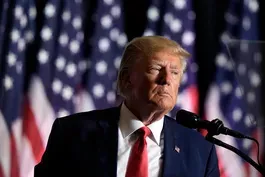
What's next for Russia in Africa after Prigozhin death
Clip: 8/28/2023 | 9m 43sVideo has Closed Captions
What's next for Russia and Wagner Group in Africa following death of Prigozhin
For many, the fiery demise of Yevgeny Prigozhin was foretold two months ago after his failed mutiny against Russian President Vladimir Putin. But Prigozhin and his mercenary Wagner Group were an important expeditionary force for the Kremlin in Africa. Nick Schifrin discussed what's next for Wagner operations there with Vanda Felbab-Brown of the Brookings Institution.
Major corporate funding for the PBS News Hour is provided by BDO, BNSF, Consumer Cellular, American Cruise Lines, and Raymond James. Funding for the PBS NewsHour Weekend is provided by...

What's next for Russia in Africa after Prigozhin death
Clip: 8/28/2023 | 9m 43sVideo has Closed Captions
For many, the fiery demise of Yevgeny Prigozhin was foretold two months ago after his failed mutiny against Russian President Vladimir Putin. But Prigozhin and his mercenary Wagner Group were an important expeditionary force for the Kremlin in Africa. Nick Schifrin discussed what's next for Wagner operations there with Vanda Felbab-Brown of the Brookings Institution.
How to Watch PBS News Hour
PBS News Hour is available to stream on pbs.org and the free PBS App, available on iPhone, Apple TV, Android TV, Android smartphones, Amazon Fire TV, Amazon Fire Tablet, Roku, Samsung Smart TV, and Vizio.
Providing Support for PBS.org
Learn Moreabout PBS online sponsorshipAMNA NAWAZ: For many, the fiery demise last week of Yevgeny Prigozhin was the chronicle of a death foretold, after his mutiny two months ago against his benefactor, Russian President Vladimir Putin.
But Prigozhin and his mercenary army, the Wagner Group, were an important expeditionary force for the Kremlin, especially across parts of Africa.
Nick Schifrin looks at, what now?
NICK SCHIFRIN: Outside Red Square this weekend, a tribute to the man they call Russia's true patriot.
The Kremlin might consider Yevgeny Prigozhin a traitor, but these supporters call him and his fighters martyrs.
MARIA, Moscow Resident (through translator): They did a great job, and they are the heroes of our country.
A brilliant future awaits them.
Everyone makes mistakes.
NICK SCHIFRIN: But the Kremlin apparently did not forgive Prigozhin's betrayal.
This weekend, a Wagner fighter filmed a cemetery of Wagner fighters killed in Ukraine dismantled by Russian authorities, just as President Vladimir Putin is dismantling and apparently decapitated Wagner's empire.
That empire was vast, especially in Africa, where independent researchers say Wagner has dispatched 5,000 people to about a dozen countries to spread Moscow's influence and feed instability.
In the Central African Republic, Wagner fighters openly walked alongside local bodyguards to help Faustin-Archange Touadera win a referendum that could extend his power indefinitely.
In Mali, where crowds have celebrated cooperation with Russia, Wagner is a key partner to the head of the military junta that seized power in 2020.
And in Burkina Faso after a coup, Wagner moved in as military officials evicted French troops and called Russia a strategic partner.
But in July in St. Petersburg, during a Russia-Africa summit, it was Putin, not Prigozhin, pictured next to each of these leaders.
And General Andrey Averyanov of Russian military intelligence was reportedly introduced is taking over for Prigozhin in Africa.
In his final days, Prigozhin was afraid of losing his influence in Africa and released this final personal statement, even as Russian officials work to maintain the empire he built without him.
YEVGENY PRIGOZHIN, Wagner Group Chief (through translator): Wagner private military company conducts reconnaissance and other actions, making Russia even greater and Africa more free.
NICK SCHIFRIN: Prigozhin considered himself popular and indispensable.
And whether in Ukraine or Africa, he held Wagner's diverse activities together through personality and brutality.
But, in Putin's Russia, nobody is indispensable, except the boss.
VLADIMIR PUTIN, Russian President (through translator): He was a man with a complicated fate, and he made serious mistakes.
NICK SCHIFRIN: The Kremlin spokesman said today no decision had been made yet on whether Putin would attend Prigozhin's funeral.
For more on what becomes of Wagner operations in Africa, we turn to Vanda Felbab-Brown, director of the Initiative on Nonstate Armed Actors at the Brookings Institution.
Thank you very much.
Welcome to the "NewsHour."
How much influence did Wagner have in Africa, and how effective have they been?
VANDA FELBAB-BROWN, Brookings Institution: Well, Wagner did have very significant influence.
It was the front of Russian foreign policy, and it was important and strategic forward thrust and, frankly, countering U.S. interest.
It had very little effectiveness in terms of counterterrorism and counterinsurgency, its ostensible mission, the cover under which Wagner entered various countries in Africa.
In reality, what Wagner ended up selling was a Praetorian Guard service for people in power, along with a whole variety of economic services, political manipulation, misinformation.
NICK SCHIFRIN: And that guard, that misinformation, that manipulation, how integral, how essential was Prigozhin to creating that empire?
VANDA FELBAB-BROWN: Well, we are all trying to understand that.
I mean, there's a lot of mythology about Prigozhin.
But I don't think it's realistic to assume that one man controlled what was the vast empire of hundreds of companies dealing with tens of billions of dollars and managing thousands of forces operating across many countries.
In fact, we know that many people who died along with him on that plane were his key logistical operators, financial operators.
So I think that Prigozhin is very replaceable, even if the aura of the man who will be in charge of whatever is left of Wagner will be very different and his profile probably much less visible than that of Prigozhin.
NICK SCHIFRIN: So, let's talk about what's left of Wagner, as it were.
The Russian officials, military intelligence have been going through Africa to the African governments saying that your partner today is us, is the Kremlin, is Moscow, not Prigozhin.
Is that effort working?
VANDA FELBAB-BROWN: Well, we are able to see clearly there is an effort to both indicate that the services that Wagner extended will be preserved.
And this effort has been under way for a considerable amount of time, even before what just happened in the assassination of Prigozhin.
But, at the same time, the empire is being chopped up.
It is being divided into smaller entities that are easier to hold.
But I think it's significant to note that just immediately after the mutiny, even countries like the Central African Republic, which were almost under the thumb of the Wagner Group, immediately expressed that their relationship has been with the Kremlin and with Russia.
Already, then, the phrasing from the African leaders themselves was very specifically understanding that whatever services they bought from Wagner, they understood that, behind Wagner, there was the Kremlin, and that had not changed for them.
NICK SCHIFRIN: And as that empire, as you said, is chopped up, easier to hold, does that mean that the Kremlin believes that, instead of replacing Prigozhin with one person, replacing Wagner with one company, it's more likely to replace them with multiple companies and multiple people?
VANDA FELBAB-BROWN: I think that is far more likely.
And that is, frankly, what we are seeing.
So, in some parts of the world, like in Syria, we are seeing that Wagner forces have been rolled on to the rosters of the Russian military and Wagner commanders have been replaced with Russian military commanders, because Russia already had the military deployed there.
But, in other parts of Africa, we may have some entity that is called Wagner left.
Apparently, for example, in the Central African Republic, the man who currently leads the Wagner forces is to remain as the leader.
In other parts, we are seeing efforts to roll parts of Wagner into other Russian private security companies.
NICK SCHIFRIN: And so we have Redoubt.
We have Convoy.
These are essentially new private military companies, or at least private military companies that will increase their influence in Africa that are more controllable, perhaps, is the right way to say it, than Wagner, right?
VANDA FELBAB-BROWN: I think that's the Kremlin's calculation, that a set of smaller companies, one of which still might be called Wagner, others which are newer, perhaps some that will be completely brand-new, will be far easier to extend than one-mafia fiefdoms that Prigozhin was running.
Of course, there was an advantage to the Wagner Group's big conglomerate.
It created an enormous name.
It was one supermarket for African leaders to go shop for political manipulation, military Praetorian Guard services, misinformation campaign.
And it will take some time for a new entity to be able to provide this set of services.
And, quite likely, Moscow might not want all one company to provide all of these services.
NICK SCHIFRIN: And not get as powerful as Prigozhin and Wagner did.
VANDA FELBAB-BROWN: Exactly.
NICK SCHIFRIN: But, at the same time, Prigozhin's personality, his brutality did keep these diverse companies, these diverse assets together.
British military intelligence recently said that: "Prigozhin's hyperactivity, exceptional audacity and a drive for results and extreme brutality are unlikely to be matched by any successor."
Is it possible that the Kremlin's efforts to take from Wagner what Prigozhin held and instead hold it themselves might fail?
VANDA FELBAB-BROWN: I think it's possible.
I don't think that we will see a situation where we will have wholesale liquidation of what Wagner did or what it brought to the Kremlin, which included significant financial income in avoidance of Western sanctions, which provided significant money laundering services and way to hide money to be brought to Moscow, as well as strategic thrust and forward presence.
I would also add here, though, that what gave Prigozhin the visibility, the audacity was also what was his downfall.
And many operator in the clandestine services would really want to keep much lower profile.
Ultimately, Prigozhin's greatest asset was not his logistical genius, but was his closeness to Vladimir Putin.
And when he lost that, that's when he lost the power and the empire and his life.
NICK SCHIFRIN: Vanda Felbab-Brown, thank you very much.
Judge sets trial date for Trump's election interference case
Video has Closed Captions
Federal judge sets March trial date for Trump's federal election interference case (4m 38s)
Shakeups looming for college football powerhouse conferences
Video has Closed Captions
A look at the major shakeups looming for college football's powerhouse conferences (5m 50s)
Tamara Keith and Errin Haines on Trump's trial date
Video has Closed Captions
Tamara Keith and Errin Haines on Trump's trial date and who's seeing a post-debate bounce (9m 54s)
Where race issues stand 60 years after March on Washington
Video has Closed Captions
Where issues of race and activism stand 60 years after March on Washington (9m 54s)
Why some lawmakers want to reform the Endangered Species Act
Video has Closed Captions
Why some lawmakers want to reform the Endangered Species Act (7m 16s)
Providing Support for PBS.org
Learn Moreabout PBS online sponsorshipMajor corporate funding for the PBS News Hour is provided by BDO, BNSF, Consumer Cellular, American Cruise Lines, and Raymond James. Funding for the PBS NewsHour Weekend is provided by...

















